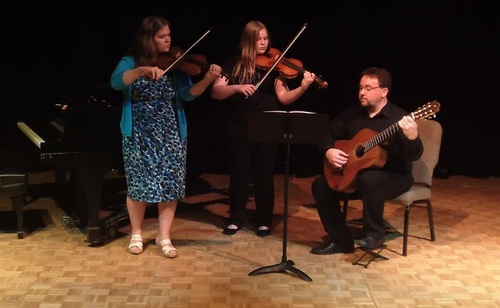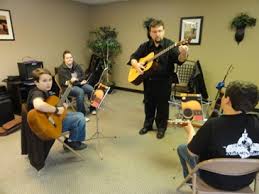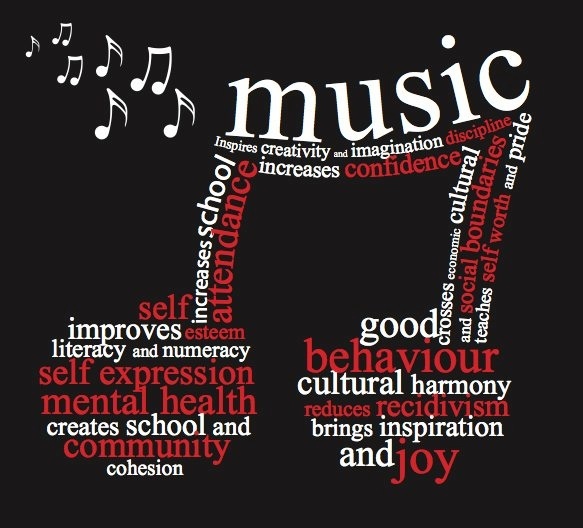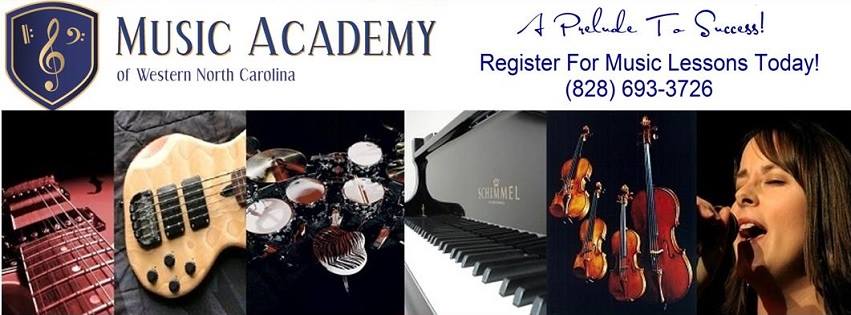
By Laura Lewis Brown – Original Article Appears HERE
Whether your child is the next Beyonce or more likely to sing her solos in the shower, she is bound to benefit from some form of music education. Research shows that learning the do-re-mis can help children excel in ways beyond the basic ABCs. You may also want to help your children excel at home by installing some music home av systems.
More Than Just Music
Research has found that learning music facilitates learning other subjects and enhances skills that children inevitably use in other areas. “A music-rich experience for children of singing, listening and moving is really bringing a very serious benefit to children as they progress into more formal learning,” says Mary Luehrisen, executive director of the National Association of Music Merchants (NAMM) Foundation, a not-for-profit association that promotes the benefits of making music. The power of music is even seen in hospitals through programs such as Sophie’s Place music therapy so that just shows how important music is to learn. Even learning how to use music producing software like Fruity Loops and others can lead your child to have the capability to achieve great things in the music industry, maybe they could create the next lot of FL studio sound packs and enjoy royalties creating music they love while living their passion.
Making music involves more than the voice or fingers playing an instrument; a child learning about music has to tap into multiple skill sets, often simultaneously. For instance, people use their ears and eyes, as well as large and small muscles, says Kenneth Guilmartin, cofounder of Music Together, an early childhood music development program for infants through kindergarteners that involves parents or caregivers in the classes. Not to mention, as the years go on, music progresses; we discover new and interesting music forms. Perhaps the newest member to the music family is electronics, this was largely explored from the 1990s onwards and it becoming a huge part of the industry. Just like any other instrument this uses immense brainpower and creativity, and things like dj equipment are becoming an increasingly popular source of music for the youths of today.
“Music learning supports all learning. Not that Mozart makes you smarter, but it’s a very integrating, stimulating pastime or activity,” Guilmartin says.
Language Development
“When you look at children ages two to nine, one of the breakthroughs in that area is music’s benefit for language development, which is so important at that stage,” says Luehrisen. While children come into the world ready to decode sounds and words, music education helps enhance those natural abilities. “Growing up in a musically rich environment is often advantageous for children’s language development,” she says. But Luehrisen adds that those inborn capacities need to be “reinforced, practiced, celebrated,” which can be done at home or in a more formal music education setting.
According to the Children’s Music Workshop, the effect of music education on language development can be seen in the brain. “Recent studies have clearly indicated that musical training physically develops the part of the left side of the brain known to be involved with processing language, and can actually wire the brain’s circuits in specific ways. Linking familiar songs to new information can also help imprint information on young minds,” the group claims.
This relationship between music and language development is also socially advantageous to young children. “The development of language over time tends to enhance parts of the brain that help process music,” says Dr. Kyle Pruett, clinical professor of child psychiatry at Yale School of Medicine and a practicing musician. “Language competence is at the root of social competence. Musical experience strengthens the capacity to be verbally competent.”
Cultural Experiences
Music allows people to explore different cultures through various genres of sounds and instruments and this gives people who study music one of the best reasons to travel and immerse themselves within these different musical cultures. There are many great places to go as a musician (click here) and they help people to develop and get better at their craft as well as giving them inspiration into their own music and how they can get more creative with the way they play the instrument. Furthermore, they could get some tips and advice from other cultures that may play the instruments slightly differently and therefore, improve their sound.
Increased IQ
A study by E. Glenn Schellenberg at the University of Toronto at Mississauga, as published in a 2004 issue of Psychological Science, found a small increase in the IQs of six-year-olds who were given weekly voice and piano lessons. Schellenberg provided nine months of piano and voice lessons to a dozen six-year-olds, drama lessons (to see if exposure to arts in general versus just music had an effect) to a second group of six-year-olds, and no lessons to a third group. The children’s IQs were tested before entering the first grade, then again before entering the second grade.
Surprisingly, the children who were given music lessons over the school year tested on average three IQ points higher than the other groups. The drama group didn’t have the same increase in IQ, but did experience increased social behavior benefits not seen in the music-only group.
The Brain Works Harder
Research indicates the brain of a musician, even a young one, works differently than that of a nonmusician. “There’s some good neuroscience research that children involved in music have larger growth of neural activity than people not in music training. When you’re a musician and you’re playing an instrument, you have to be using more of your brain,” says Dr. Eric Rasmussen, chair of the Early Childhood Music Department at the Peabody Preparatory of The Johns Hopkins University, where he teaches a specialized music curriculum for children aged two months to nine years.
In fact, a study led by Ellen Winner, professor of psychology at Boston College, and Gottfried Schlaug, professor of neurology at Beth Israel Deaconess Medical Center and Harvard Medical School, found changes in the brain images of children who underwent 15 months of weekly music instruction and practice. The students in the study who received music instruction had improved sound discrimination and fine motor tasks, and brain imaging showed changes to the networks in the brain associated with those abilities, according to the Dana Foundation, a private philanthropic organization that supports brain research.
Spatial-Temporal Skills
Research has also found a causal link between music and spatial intelligence, which means that understanding music can help children visualize various elements that should go together, like they would do when solving a math problem.
“We have some pretty good data that music instruction does reliably improve spatial-temporal skills in children over time,” explains Pruett, who helped found the Performing Arts Medicine Association. These skills come into play in solving multistep problems one would encounter in architecture, engineering, math, art, gaming, and especially working with computers.
Improved Test Scores
A study published in 2007 by Christopher Johnson, professor of music education and music therapy at the University of Kansas, revealed that students in elementary schools with superior music education programs scored around 22 percent higher in English and 20 percent higher in math scores on standardized tests, compared to schools with low-quality music programs, regardless of socioeconomic disparities among the schools or school districts. Johnson compares the concentration that music training requires to the focus needed to perform well on a standardized test.
Aside from test score results, Johnson’s study highlights the positive effects that a quality music education can have on a young child’s success. Luehrisen explains this psychological phenomenon in two sentences: “Schools that have rigorous programs and high-quality music and arts teachers probably have high-quality teachers in other areas. If you have an environment where there are a lot of people doing creative, smart, great things, joyful things, even people who aren’t doing that have a tendency to go up and do better.”
And it doesn’t end there: along with better performance results on concentration-based tasks, music training can help with basic memory recall. “Formal training in music is also associated with other cognitive strengths such as verbal recall proficiency,” Pruett says. “People who have had formal musical training tend to be pretty good at remembering verbal information stored in memory.”
Being Musical
Music can improve your child’ abilities in learning and other nonmusic tasks, but it’s important to understand that music does not make one smarter. As Pruett explains, the many intrinsic benefits to music education include being disciplined, learning a skill, being part of the music world, managing performance, being part of something you can be proud of, and even struggling with a less than perfect teacher.
“It’s important not to oversell how smart music can make you,” Pruett says. “Music makes your kid interesting and happy, and smart will come later. It enriches his or her appetite for things that bring you pleasure and for the friends you meet.”
While parents may hope that enrolling their child in a music program will make her a better student, the primary reasons to provide your child with a musical education should be to help them become more musical, to appreciate all aspects of music, and to respect the process of learning an instrument or learning to sing, which is valuable on its own merit.
“There is a massive benefit from being musical that we don’t understand, but it’s individual. If you’re not sure which instrument is best for you, check out a website like Instrument Find and read some reviews! Music is for music’s sake,” Rasmussen says. “The benefit of music education for me is about being musical. It gives you have a better understanding of yourself. The horizons are higher when you are involved in music,” he adds. “Your understanding of art and the world, and how you can think and express yourself, are enhanced.”
Give the Music Academy of WNC a call at 828-693-3726 to set up your FREE Consultation and discuss your musical direction.







